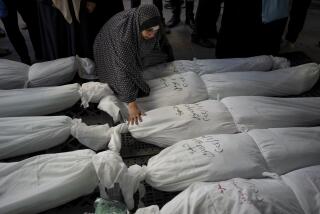Vow of Reform by Arafat Is Doubted
- Share via
RAMALLAH, West Bank — Responding to Palestinian critics who say his autocratic rule has led his people to disaster, Yasser Arafat engaged in rare public self-criticism Wednesday, acknowledging to his skeptical parliament that he has made mistakes and promising government reform and early elections.
“I’m calling for a reevaluation of all our administrative and ministerial bodies, the security apparatuses, after there have been signs of mismanagement here and there that are impossible to conceal from public opinion,” Arafat said in a speech to a session of the Palestinian Legislative Council.
“We have all made efforts to build and to do,” the Palestinian Authority president said. “We may have made mistakes or caused damage
In a sign of growing public discontent with his leadership, Arafat got a chilly reception from the lawmakers. Several complained after the speech that he offered neither a date for elections nor specifics on how to remake a government widely viewed as corrupt and incompetent. The only balloting for parliament and president was held in 1996.
“He speaks in general about reforms. We need decisions. We need a new government to implement them, and we need time to see if the president will implement his promises,” said Nabil Amr, who resigned as the minister for parliamentary affairs to protest the Palestinian government’s response to Israel’s recent five-week-long invasion of the West Bank.
Amr said Arafat should immediately dismiss his Cabinet, composed largely of officials from the president’s Palestine Liberation Organization who lived in exile for years before returning to the West Bank and Gaza Strip after the 1993 Oslo peace accords were signed.
“We need a Cabinet of technocrats” to handle the daunting task of rebuilding infrastructure destroyed during Israel’s operation, Amr said. “We need to organize the security forces to make them more professional, and we need to support the judiciary. We need real reform, and we must start today.”
Arafat defended his aides and Cabinet ministers during his speech, saying Palestinians were wrong to criticize them for cutting deals that ended the Israeli army’s sieges of his Ramallah headquarters and Bethlehem’s Church of the Nativity.
“Put it all on my shoulders. I can handle it,” he said in a departure from his prepared text. Legislators should remember, he said, “there is no movement in which mistakes are not found.”
Leaders of Arafat’s mainstream Fatah movement and many other Palestinians have criticized him and his aides for agreeing, as a condition for ending the sieges, to exile or imprison fighters wanted by Israel. Arafat also has come under fire for failing to mount a defense against Israel’s invasion of the West Bank and failing to create a social safety net for Palestinians since their uprising erupted in September 2000.
“After the tanks have come into our towns, people want clear statements,” said Ahmad Deik, a Fatah leader and member of parliament who recently has written newspaper articles in favor of reform. “The important thing for us is to know when we can build a modern Palestinian political system.”
Arafat’s speech came the day after Israeli Prime Minister Ariel Sharon told the Israeli parliament that peace with the Palestinians would be possible only after broad reforms were made in the Palestinian government, security forces and society.
A spokesman for Sharon dismissed Arafat’s talk of reform.
“If the Palestinians really want to move on the road to peace, they should forget the speech their leader made today inciting people for war,” said Raanan Gissin, noting that Arafat failed to explicitly order an end to all attacks. “It’s not enough to say you’re against it. We need action.”
Pressure has been mounting on Arafat, since he emerged from Israel’s siege of his Ramallah headquarters, to rein in militias, reorganize his various security forces and end government corruption. The European Union, a key financial backer of the Palestinian Authority, is making new aid contingent upon greater fiscal accountability and other reforms. President Bush has also called for changes.
In Washington, the White House on Wednesday hailed Arafat’s words, calling them “positive.” But Press Secretary Ari Fleischer cautioned that Bush “will wait to see whether or not Yasser Arafat and others in the Palestinian Authority actually take actions that lead to a better life for the Palestinian people and actions that lead to a region that can live in more stability and security.”
Arafat delivered his address on Naqba Day, which marks Israel’s declaration of independence in 1948. Palestinians refer to that event as the naqba, or catastrophe, and consider it the beginning of their exile from their homeland.
Arafat’s critics have said that Israel’s invasion of the West Bank, launched March 29 in response to a wave of suicide bombings, is the new naqba. Across the West Bank, the damage inflicted during the massive military operation is still everywhere in evidence. A group of donor nations and relief agencies released a report Wednesday that put the cost of the physical damage at $361 million, with indirect costs at several times that amount.
The members of parliament who gathered to listen to Arafat on Wednesday had to do so in a reception hall of the Education Ministry because their legislative building next door was damaged during the Israeli incursion last month.
In another sign of the times, lawmakers from the Gaza Strip could only gather there and watch the speech on a video screen because their area is sealed off by the Israeli army. Most legislators from the northern West Bank also could not attend because the army maintains sieges around some towns.
Times staff writers Mark Magnier in Jerusalem and Edwin Chen in Washington contributed to this report.
More to Read
Sign up for Essential California
The most important California stories and recommendations in your inbox every morning.
You may occasionally receive promotional content from the Los Angeles Times.













